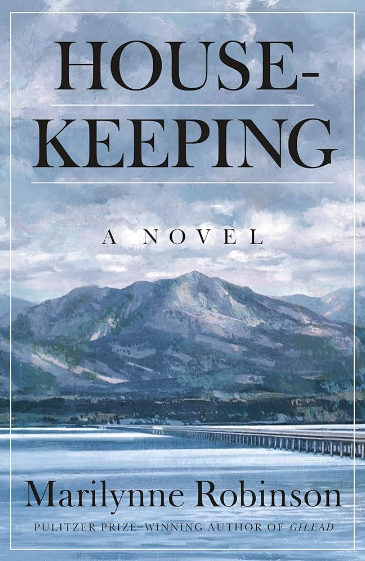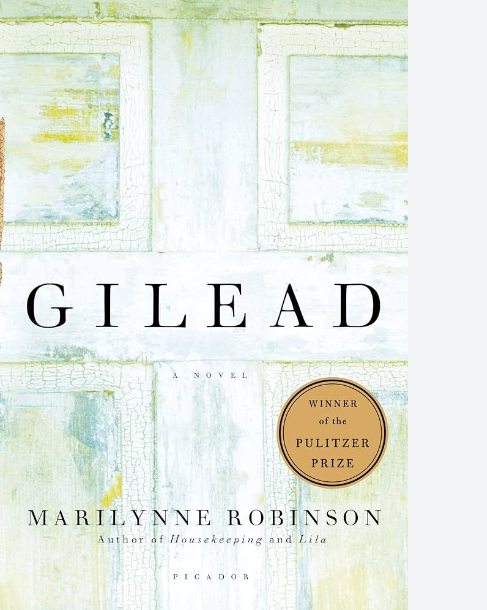See my full-length book reviews for these two at the following page link: Housekeeping / Gilead; Marilynne Summers Robinson – Welcome (10000daysreadwriterun.com)
These books are off the beaten path for me. Recently I have found some works of historical fiction by very accomplished American writers. Willa Cather wrote a century ago, she was a revelation to me. Marilynne Robinson walked into my life straight from the sale paperback table in Barnes and Noble. I am not immune to these temptations. The irony is that I had picked up an older paperback copy of Gilead many years ago. I recall reading a few pages and putting it aside due to the perceived content and deliberate story pacing. And there it sat on bookshelves and inside of bedside cabinets for a decade or more.
“Housekeeping” was published in 1980. It tells the story of Ruth and her younger sister, Lucille, who grow up in a remote part of the Northwest, close by to the Canadian border. Their fictional home in the small town of Fingerbone is apparently based on Sandpoint in northern Idaho, which is Robinson’s hometown.

“Fingerbone was never an impressive town. It was chastened by an outsized landscape and extravagant weather, and chastened again by an awareness that the whole of human history had occurred elsewhere… ‘My name is Ruth. I grew up with my younger sister, Lucille, under the care of my grandmother, Mrs. Sylvia Foster, and when she died, of her sisters-in-law, Misses Lily and Nona Foster, and when they fled, of her daughter, Mrs. Sylvia Foster.”
The circumstances of the passing of their grandparents and abandonment by their mother Helen (who subsequently drove her car off a cliff) left them left them stranded under the care of these transient and unstable relatives. Their great aunts found care of these young sisters to be too difficult and they retreated to Washington State, after summoning her proper aunt Sylvia. Sylvia is portrayed as a transient with odd notions of proper behavior, a free spirit who does not try to bring order or structure to the home.
“Having a sister or a friend is like sitting at night in a lighted house. Those outside can watch you if they want, but you need not see them. You simply say, “Here are the perimeters of our attention. If you prowl around under the windows till the crickets go silent, we will pull the shades. If you wish us to suffer your envious curiosity, you must permit us not to notice it… “Because, once alone, it is impossible to believe that one could ever have been otherwise. Loneliness is an absolute discovery.”
“Their lives spun off the tilting world like thread off a spindle, breakfast time, suppertime, lilac time, apple time.” …. “When we did not move or speak, there was no proof that we were there at all.”
The two young girls experiment with truancy, and though originally close, they separate in interests and aspirations; eventually Lucille moves out of the house to the care of Miss Royce, a home economics teacher from their school. Ruth stays behind with Sylvie through several local adventures and eventual escape, just the two of them truly alone in the world; perhaps where they were meant to be all along.
The pace is of the writing is slow and deliberate, the characters and events are descriptive, as if occurring in the present. Descriptions of locations clear and precise. Dialog is direct. Great writing holds you close to the people and plots and events. The measure of a good story is whether you can truly picture the characters as individuals. Like viewing their lives through a window into their homes and thoughts and actions. This book meets the mark.
The story of this remote town and the carefully described characters stayed with me, a place and a time far removed, though the writing speaks in the present tense. If you appreciate this type of spare yet vivid writing style, consider giving it a read
__________________________________________________________________________________________
After finishing this book, I decided to re-approach her later novel Gilead, which won a Pulitzer Prize for fiction in 2005.

The narrator of the story, Reverend John Ames, is an aging Congregational Minister. After the death of his first wife during the birth of his only child, he lived on his own for several years. Eventually he re-married, a younger woman (Lila) who had joined his church; she proposed to him, and they had one son. Lila is more than 30 years younger than John and is 41 during the time of the novel.
“I could have married again when I was still young. A congregation likes to have a married minister, and I was introduced to every niece and sister-in-law in a hundred miles. When your mother did come, when I hardly knew her, she gave me that look of hers-no twinkle in that eye-and said very softly and very seriously, “you ought to marry me”. That was the first time in my life I ever knew what it was like to love another human being. …she walked away, and I had to follow her along the street. I still didn’t have the courage to touch her sleeve, but I said, ‘You are right, I will.” And she said, “Then I’ll see you tomorrow, and kept on walking.”
His health in decline, Ames expresses concern and regret that his seven-year-old son will have few memories of him as he grows into adulthood. He commits to composing a memoir of sorts, chronicling the history of his family dating back to the civil war, the ministries of his grandfather, and of his father as well. His writings reflect on the actions of his family and their influence on him as he entered the ministry, just as his forbearers before him.
As he progresses with his personal memoir, he introduces a Reverand Boughton, the paternal head of a large extended family, local Presbyterian minister, and Ames dear and lifelong friend. A plotline arises from Ames fractured relationship with Boughton’s son Jack Boughton, who returns to Gilead after 20 years away, to make peace with his past domestic troubles, involving an abandoned relationship with a woman and her child. In addition, he is estranged from a second tenuous marital relationship.
Despite his anger at Jack’s past transgressions, John also perceives that there is a deep loneliness and sadness in Jack. Despite his ambivalence about Christianity, he willingly receives John’s blessing before he goes. As he leaves the rest of Boughton’s large family are gathering to be with him in his final days. John Ames ends his letter with a prayer that the young man (his son) grows up to be “a brave man in a brave country”, and to find a way to be useful.” A gentle denouement. Like Housekeeping, the pace of the book is deliberate, the writing is precise, the plotlines are spare but clear in purpose. A few of my favorite passages follow:
“Sometimes I have loved the peacefulness of an ordinary Sunday. It is like standing in a newly planted garden after a warm rain. You can feel the silent and invisible life.”
“Memory can make a thing seem to have been much more than it was.”
“I’ve developed a great reputation for wisdom by ordering more books than I ever had time to read, and reading more books, by far, than I learned anything useful from, except, of course, that some very tedious gentlemen have written books.”
There’s so much to be grateful for, words are poor things.”
Historical fiction is a window to another time, and these two stories reveal universal truths about human nature. In this season of my life, I begin to reflect more on the transitions of family, friends, and career; paths taken and people who have intersected my life, what was then and what is now. Those I have carried close still. I do not carry nostalgia well; it is best to always look forward. Though the imprints of our eventful lives stay with us and the world we self-construct.
What books have you recently stumbled across that have enhanced your reading life, and perhaps your actual life?